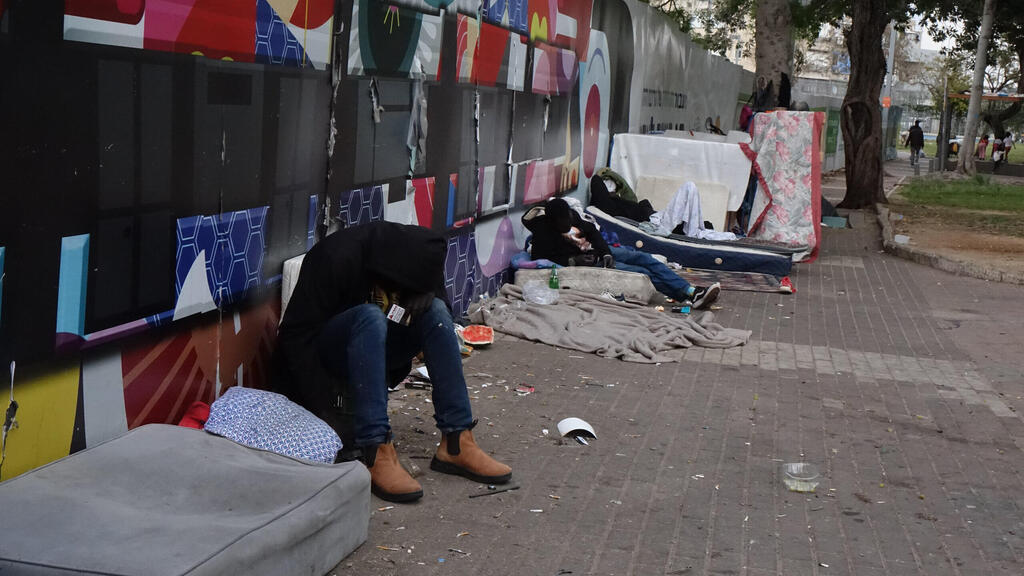Getting your Trinity Audio player ready...
Latet, an Israeli nonprofit aid organization, published its annual poverty report on Monday, shedding light on the complex economic reality in Israel during 2024 against the backdrop of ongoing war and conflict. According to the organization's multidimensional poverty index, which defines poverty as significant deprivation in relation to basic living needs and conditions, 678,200 families (22.3%) and 2,756,000 individuals (28.7%) in Israel are living in poverty. This includes 1,240,000 children, accounting for 39.6%.
While the poverty rates are similar to last year’s figures, the forecast is alarming. “The relative stability in poverty rates this year stems partly from government support for evacuees and businesses, activities by civil society and philanthropy, continued national insurance payments, and the gradual nature of descent into poverty,” the report explains. “This process typically begins with exhausting savings, moves to taking out loans, and only later becomes evident in official poverty statistics. Unfortunately, future projections indicate a worsening situation, particularly in light of the government’s new economic measures.”
The rising cost of living
The report reveals that in 2024, the minimum monthly cost of living in Israel is 5,355 shekels per person and 13,617 shekels for a household of two adults and two children. These figures represent increases of 6.5% and 6.9% respectively compared to last year. Annually, this amounts to an additional expense of approximately 4,000 shekels per person and 10,500 shekels per household. For middle-class households, normative living costs are estimated at 8,665 shekels per person and 22,181 shekels per household.
“The minimum cost of living, reflecting the basic expenses required for survival, has nearly doubled the growth in the Consumer Price Index, which stands at 3.6%,” Latet notes.
Most of the rise is attributed to higher prices for food, housing, utilities, and related costs. As a result, there is a growing population in Israel that, while not classified as poor by the National Insurance Institute, effectively lives in poverty. Households with a per-person income above the national poverty line of 4,105 shekels but below the minimum cost of living of 5,355 shekels are unable to maintain basic living standards and therefore experience varying degrees of deprivation.
The report also examines the challenges faced by those supported by Latet. "The cost of living in Israel, already high before the war, has significantly worsened," it states. "The conflict has driven up prices, particularly for food and consumer goods." The average monthly expenditure for supported households is 10,367 shekels – 1.7 times their average net monthly income of 6,092 shekels.
Debt is widespread among these households, with 78.8% reporting outstanding loans compared to 26.9% of the general population. The financial situation of 65% of Latet beneficiaries and 32.1% of the general public has deteriorated over the past year. Among the supported population, 69.5% are unable to repair severe home defects due to financial constraints, 84.8% face energy shortages, and 33.7% endure severe energy insecurity. Alarmingly, the electricity was disconnected for 22.1% in the past year due to nonpayment.
Children and the elderly are most affected
The report highlights the war's toll on children and teenagers. Academic performance has significantly declined for 44.6% of children in supported households, compared to 14.1% in the general population. Moreover, 46.7% of beneficiaries report severe mental health impacts on their children, three times higher than the general public (14.5%). About 22.8% say at least one child dropped out of school, and 18.9% had to transfer their children to boarding schools due to financial hardship. Additionally, 85.4% had to forgo private tutoring for at least one child.
The elderly population also faces unique challenges exacerbated by the conflict. Among Latet’s elderly beneficiaries, 81.7% live in poverty, and 52.6% are classified as living in extreme poverty. Over one-third (34.8%) endure severe food insecurity, and 60.4% have forgone essential medications or medical treatments because they could not afford them.
Research conducted for the report underscores the daily struggles of supported families, especially regarding food insecurity. "Many supported households live in constant fear of running out of food and being unable to buy more or provide balanced meals for their children," Latet states. About 80% of beneficiaries report instances where food ran out, and they lacked funds to purchase more. Additionally, 62.4% reduced or skipped meals due to financial constraints, compared to 16% in the general population. Among parents, 50.5% had to forgo or reduce recommended infant formula for their babies, compared to 12% of the general population.
<< Get the Ynetnews app on your smartphone: Google Play: https://bit.ly/4eJ37pE | Apple App Store: https://bit.ly/3ZL7iNv >>
Latet's founder and president, Gilles Darmon, and its CEO, Eran Weintraub, express grave concerns about the future.
"The planned economic measures – including raising VAT, increasing social security and health insurance payments, and rising electricity, water and property tax costs – are expected to deepen the hardships faced by vulnerable populations," they warn. "The combination of inflation, high interest rates, an anti-social government budget, and the ongoing costs of recovery from the war, will likely push thousands more low-middle-class families into severe deprivation."
They conclude with a call to action. "In addition to military and security challenges, Israel faces another battle – the fight against poverty. The country stands at a moral crossroads. Solidarity and mutual responsibility will determine whether we emerge from this crisis stronger or weaker. It’s time for the government to take responsibility, act decisively to reduce poverty and inequality, and implement a comprehensive socio-economic policy that addresses the needs of all segments of society."



